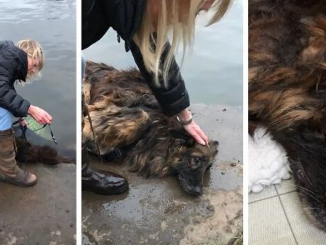Dogs’ brains are sensitive to the familiar high-pitched “cute” voice tone that adult humans, especially women, use to talk to babies, according to a new study.
The research, published recently in the journal Communications Biology, found “exciting similarities” between infant and dog brains during the processing of speech with such a high-pitched tone feature.
Humans tend to speak with a specific speech style characterised by exaggerated prosody, or patterns of stress and intonation in a language, when communicating with individuals having limited language competence.
Such speech has previously been found to be very important for the healthy cognitive, social and language development of children, who are also tuned to such a high-pitched voice.
But researchers, including those from the Eötvös Loránd University in Hungary, hoped to assess whether dog brains are also sensitive to this way of communication.
In the study, conscious family dogs were made to listen to dog, infant and adult-directed speech recorded from 12 women and men in real-life interactions.
As the dogs listened, their brain activities were measured using a functional magnetic resonance imaging (fMRI) scan.
The study found the sound-processing regions of the dogs’ brains responded more to dog- and infant-directed than adult-directed speech.
This marked the first neurological evidence that dog brains are tuned to speech directed specifically at them.
“Studying how dog brains process dog-directed speech is exciting, because it can help us understand how exaggerated prosody contributes to efficient speech processing in a nonhuman species skilled at relying on different speech cues,” explained Anna Gergely, co-first author of the study.
Scientists also found dog- and infant-directed speech sensitivity of dog brains was more pronounced when the speakers were women, and was affected by voice pitch and its variation.
These findings suggest the way we speak to dogs matters, and that their brain is specifically sensitive to the higher-pitched voice tone typical to the female voice.
“Remarkably, the voice tone patterns characterizing women’s dog-directed speech are not typically used in dog-dog communication – our results may thus serve evidence for a neural preference that dogs developed during their domestication,” said Anna Gábor, co-first author of the study.
“Dog brains’ increased sensitivity to dog-directed speech spoken by women specifically may be due to the fact that women more often speak to dogs with exaggerated prosody than men,” Dr Gabor said.

Sending Belated Birthday Greetings: Expressing Your Good Wishes with a Personal Touch
Living in today’s world, it can be simple to forget about an important occasion like a loved one’s birthday. The fast-paced nature of life, unforeseen circumstances, or even just not remembering can cause us to miss out on commemorating an important day.

Although the birthday may have already passed, it’s never too late to make amends and show your sincerest belated wishes. In this article, we’ll explore how to express your feelings with truthfulness, personalization, and affection.
To begin, you must acknowledge that you missed their special day, but emphasize that it doesn’t diminish its importance in your heart. A heartfelt belated wish can mean just as much as an on-time one, so don’t let lateness prevent you from reaching out.
Think about what makes your relationship with the person unique and use those details to craft a thoughtful message that reflects your shared experiences, inside jokes, or precious memories. Adding a personal touch to your belated birthday wishes shows that you’ve taken the time to reflect on your bond and make your message special.
Choosing the right medium to convey your message is also essential. A handwritten letter or a carefully selected card can serve as tangible keepsakes, while a heartfelt video message adds a personal touch. The medium you select should align with your style and the recipient’s preferences.
Make sure your belated birthday wishes are genuine and express real regret for the delay. Let the person know that they matter to you and that you hold them dear, even if you didn’t acknowledge their special day on time. Your sincerity and the warmth of your words can help make up for the late wishes.
Turn your belated birthday wishes into an opportunity to highlight the positives. Celebrate their achievements, their impact on your life, or the joy they bring to those around them. Remind them of their significance and why they are so special to you. This positive reinforcement can turn a belated wish into a heartfelt celebration.
If possible, plan a special get-together or activity to compensate for the delay. This demonstrates your commitment to creating lasting memories, even if it’s slightly delayed. It shows that you’re willing to make amends and celebrate their special day in a memorable way.
A little bit of humor can also go a long way. Consider adding a well-placed joke or witty comment to your belated birthday wishes to make the person smile and lessen any disappointment from the late wishes. It shows that you can laugh at yourself, and the relationship is strong enough to handle a little lateness.
If you choose to send a gift along with your belated birthday wishes, think about the person’s interests and preferences. A thoughtful gift can show that you’ve put thought and effort into selecting something meaningful. Let this be an opportunity to make up for the late wishes and show that you care.



Leave a Reply